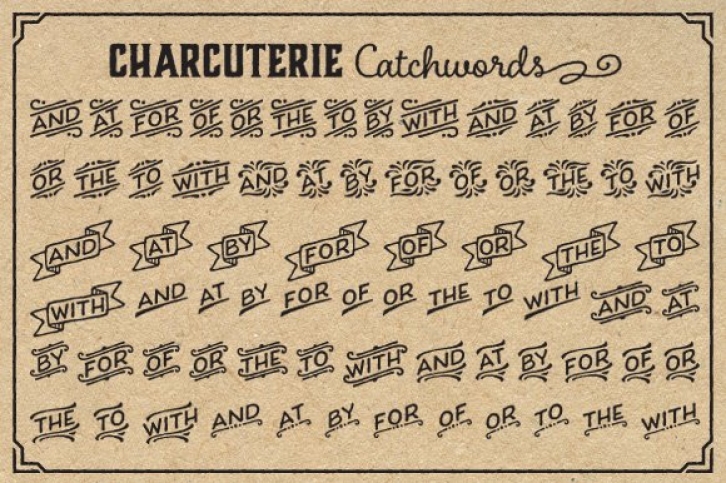

NOTE: For questions, including how to use this font and access alternates, please visit the FAQs page on my website: http://lauraworthingtontype.com/faqs/
Your download will include both an OTF (OpenType Font/Format) and a TTF (TrueType Font/Format).
A large and rare undertaking, Charcuterie is a family of ten distinct yet related typefaces, many of which have their own font families, and three decorative/ornamental typefaces.
Shown here, is Charcuterie Catchwords, which feature nine different styles for a total of 82 glyphs. Buy the entire collection, 22 fonts for $79 here: http://crtv.mk/gNMm
Be sure to take a look at the other offerings within the Charcuterie family, such as:
• Charcuterie Block http://crtv.mk/tMFR • Charcuterie Sans http://crtv.mk/hNzo • Charcuterie Serif http://crtv.mk/hNzp • Charcuterie Flared http://crtv.mk/sMFI • Charcuterie Contrast http://crtv.mk/iNoH • Charcuterie Deco http://crtv.mk/gNbt • Charcuterie Filigree http://crtv.mk/rMKF • Charcuterie Cursive http://crtv.mk/iNoL • Charcuterie Engraved http://crtv.mk/tMFX • Charcuterie Etched http://crtv.mk/gNbu • Charcuterie Frames http://crtv.mk/tMFa • Charcuterie Ornaments http://crtv.mk/jNqc
This ambitious, yet accessible, set offers a virtually endless series of combinations, allowing each designer to form a tasty platter of ingredients, one that is uniquely theirs, for each project. Used solo or blended with other fonts from this large family, elements of Charcuterie are well suited for headlines, titling, logos, display, packaging, signage, or advertising. Dig deep into each typeface to find a rich set of fonts (the number depending on the typeface), revealing variations upon variations.
The word charcuterie means the preparation of meats. Today, it often refers to a wide and varied selection of meats served together, listed as a single, beautiful, and complex menu item.
Charcuterie celebrates the personally crafted—the sense of the human touch giving it a slightly rough edge that only adds to its charm. The “roughness†derives from a slight stressing and small irregularities in some fonts. This bit of unevenness doesn't dominate the look—it's simply the personality and humanity of the type designer cooked into the final piece.
Charcuterie is an homage to the inventiveness, passion, and care of peasants who proudly handed down recipes through generations. Their humble fare is used by bistro chefs to create masterpieces by ever so slightly transforming the simple into the sumptuous. Similarly, with Charcuterie the designer can employ the handcrafted look of the many letters within these font families to create a project that is jaunty, quirky, and juicy or one that is a gloriously rich and varied feast for the eyes.
The family of Charcuterie is a bit reminiscent of early 1900s styling, not precisely Bauhaus or Art Deco, not a revival, but an imagined restoration based on memory, captured from novels and movies set in Paris, a modern echo of collections of impressions of a time when people strolled along and stopped to read a French bistro chalkboard menu drawn with letters that resemble Charcuterie. It was a way of living, of enjoying the food of the well-considered choices of the trained, experienced bistro chef, of sipping local wines and basking in the warmth of chatting with friends on leisurely weekends, sitting at little tables and observing the passersby. Charcuterie is a smorgasbord of delightful type inspired by our sense of a happy time at a splendid table.
Charcuterie also serves to transcend a central taboo in our industry—that of mixing too many fonts in one page or project. This forbidden act gained its unfortunate reputation from abuse and excess or simple inexperience. Charcuterie brings back a powerful tool for artfully tackling a project and retaining all the complexity the designer envisions. It does all the heavy lifting, taking the guesswork out of combining typefaces and providing a set unified by the eye and hand of one type designer. Despite the multitude of font combinations available, there is a sense of harmony and continuity, just as the interior design world discovered that they could, indeed, combine plaids, stripes, and florals if they were based on a common thread: such as the same tones or intensities of hues. The single hand that created Charcuterie imposes a sense of compatibility, despite how different the fonts initially appear to be. The further glue that holds this set together is the availability of font files, purchased separately, of decorative elements: Charcuterie Catchwords, Charcuterie Ornaments, and Charcuterie Frames (borders, corners, and frames).
If you'd prefer, purchase individual fonts within these typeface families. Each is strong enough to stand on its own. However, using elements from many of these faces and fonts adds layers of textures and richness to your work, and with their infinite number of variations, flavors the work with your own talent and flair. The entire family lends itself to experimentation, acting as a complete and complex toolbox, enabling you to work in extraordinarily varied ways within the subtle yet studied constraints of the collection as a whole.
